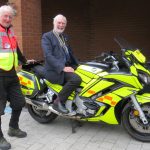
Warwick Rotary President David Smith tried a Yamaha 1200cc motorbike for size this week when Bob Badland of Warwickshire & Solihull Blood Bikers (WSBB) came to lunch.
Bob told the club that WSBB is one of 31 “stations” of blood bikers across the UK which sends volunteers to help the NHS free of charge. The service started in 1962 when a biker realised motorbikes were needed to ferry urgently needed medical supplies around London. The service has grown from that beginning and is now a nationwide network. WSBB has between 120-130 members who are available between the hours of 7pm to 6 am across the West Midlands.
WSBB have 3 bikes and a 4wd car to enable them to work in all weathers as well as a liveried van to carry exhibition boards, and the WSBB gazebo. They do around 1,000 runs a year, ferrying anything up to 20,000 items between the blood bank at the Queen Elizabeth Hospital site in Birmingham, and Stratford, Warwick, Walsgrave, George Elliott and Rugby Hospitals as well as the Womens Hospital also in Birmingham. The bikes are able to be at any hospital within 45 minutes and riders are been trained to take set routes between hospitals.
Many people do not realise the service is run by volunteers and does not charge the NHS. The Blood Bikes cost around £14,000 each, and together with the van were funded by public subscription, with the 4wd vehicle provided by the Masons.
Recently WSBB were in the news when they discovered that University Hospital Coventry & Warwickshire NHS Trust had signed a contract without consulting with them paying QE facilities, a private company, to move all their medical items between hospitals. WSBB now face the possibility of disbanding their group who are highly trained and motivated.
WSBB are in the process of explaining to the local hospitals that their service is free, and available quickly in an emergency. Lives may be lost if the contracted courier has left for the day. Hospitals now face calling a taxi at a cost of around £50 each way, and a delay whilst the taxi expects payment before delivery. A simple calculation shows this may cost the NHS thousands of pounds annually, Blood bikes cost the NHS nothing.
Bob accepted a donation from the club towards their work but undertook to return it if they are forced to disband.
Thanking Bob for his talk, Rotarian Laurie Day said he had reason to be thankful for emergency blood transport saving his baby daughter and hoped their problems could be resolved. We all hate to hear of waste in the NHS.
News